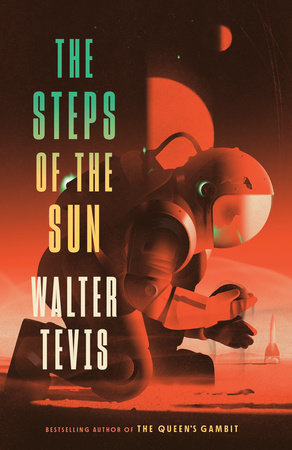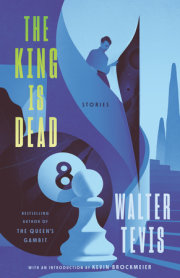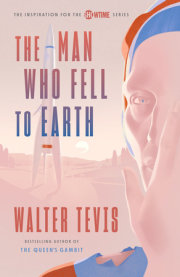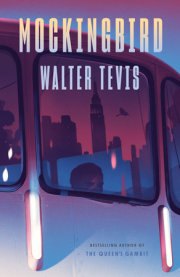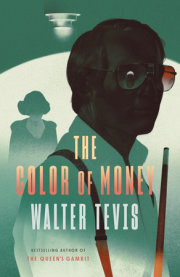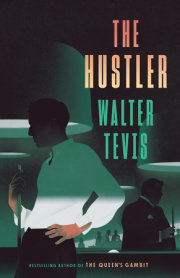1
When they knocked me out I regressed like a shot to my childhood on Earth and stayed there in a kind of wakeful dream for two months. At times I would become aware of the throbbing of the ship’s engine, of the sleek tubes that fed me, of the machines that exercised my body and of the soft voice of my trainer, but for most of the voyage I was back in my father’s house in Ohio with the smells of his cigar smoke and of his books and the awe I had felt as a child toward the certificates and diplomas on the wallpapered wall over his desk. There were faded blue flowers on that paper; it seemed I could see them more clearly from captain’s quarters on my interstellar ship than I had as a child. Forget-me-nots. There was a brownish stain near the ceiling over a framed diploma that read docteur de l’université honoraire. I sat on the green-carpeted floor and stared silently at the stain. My father, silent also, read from an old book in German or French or Japanese, stopping every now and then to make a note on a three-by-five card or light a cigar. He never looked at me or acknowledged my presence. Mother was out; Father was stuck with keeping me. I felt guilty: Father was busy, his work was important, I was a trouble to him. I must have loved him terribly—his rare, shy smile, his quietness. I did not even hope that he would someday explain his work to me. When he died I still knew nothing about that ancient history he spent his life brooding over. I have never read his books. I had him buried in a fine cemetery, glad to be old enough and with money enough to do it right and well. I was twenty-three when he died and already rich. My father was a scholar—world-famous, I was told by Mother—and his style was genteel poverty. I loved him ardently, in silence.
I nearly awoke once here on the ship, when my trainer had allowed his attention to lapse and one of the exercise machines was straining the muscles of my abdomen. I found myself for a moment lying on my back on a red leather bench, groaning upward against steel springs in the ship’s gym and with hot tears flooding my face. I had just come from my dream trip to Father’s study, awakened fleetingly by pain. The trainer’s face was tight with anxiety. As if through a partition I heard his alarmed voice saying, “Sorry, Captain Belson,” and I muttered something about love and fell back into my chemical sleep. The astonishing thing was the tears. I had not cried at my father’s funeral. I had never mourned him. I had hardly thought of him for thirty years. And here I was at the age of fifty-two, somewhere out in the black reaches of the Milky Way, weeping copiously for him. In sleep I returned to his study and sat cross-legged on his floor, silent. I watched his concentration at his desk. Somewhere outside of me I heard the hum of the ship and exulted, propelled beyond the speed of light toward constellations totally outside my father’s understanding.
They woke me two weeks before planetfall. There was a crew of seventeen. I owned the ship; I had bought it a year before. We were heading toward an unexplored planet of the star Fomalhaut, known as FBR 793. It was my first voyage away from Earth.
I have always come awake quickly. There is something feral in me and I welcome it when I awaken. I was on my back in my stateroom and the ship’s doctor and navigator were standing by my bed. The doctor was holding a cup of coffee out to me. I ignored it for a moment while I looked around. The room had been painted a pale blue as I had instructed; I could dimly remember the smell of fresh paint in my sleeping nostrils. There was a porthole to my right and one crystalline star, blindingly bright against velvet black, was almost centered in it. I stretched my arms, my legs, twisted my head on my neck. There was strength in my body; I could feel it in my pectorals, my biceps, the muscles of my thighs; the sense of power went through me like a quiet euphoria. I felt my belly; the paunch was gone.
I looked back toward the doctor, reached out steadily and took the cup. There was a white porcelain vase with red roses in it on the desk by my bed.
“Thank you for the flowers,” I said.
“Glad we could grow them,” the doctor said. “How’s your head? Any hangover?”
“Not a bit, Charlie,” I said. It was true. I felt wonderful. I sipped the coffee and felt it penetrate the raw emptiness of my stomach.
“For god’s sake don’t drink it fast,” Charlie said. “Bad enough to drink it at all.”
I had told them to have coffee ready. “I know myself well enough,” I said, and continued sipping.
“It’s a new self,” the doctor said.
I looked at him over the edge of the cup, over the little red stripe that went around its porcelain edge. “Charlie,” I said, “it’s a new self but it still likes coffee.” I finished half of it and set the cup down. Then I got out of bed, a bit slowly. I was naked and tanned. I looked good. The blond hair on my arms and legs had been bleached a pale yellow by the ultraviolet lamps. “Let’s go to the bridge,” I said.
“Okay,” the navigator said, startled.
“And while I’m dressing, see if you can find me a sandwich.”
We were still too far to see the planet. I could have slept another week, since there was very little for me to do when awake. There was little for anyone to do on the ship. But two months’ sleep had been enough to get me into shape and to avoid serious boredom. I wanted to do some reading. I wanted the feel of being the owner-captain of a spaceship. I was the first man in history ever to own one and I wanted to savor the experience.
The bridge was a semicircle twenty feet across, at right angles to the ship’s acceleration. The acceleration was continuous at one-fifth G even in spacewarp, and it gave us enough weight to walk. For exercise I used springs over cams—zero-gravity Nautilus equipment. There was no such thing as an intergalactic Olympics; had there been, these machines would have prepared the athletes. I felt ready to go for a gold medal.
The sandwich turned out to be Virginia ham and gruyère. With all the cold and the vacuum around us, food-keeping was easy and we had plenty. It was a good sandwich, but half of it filled my shrunken stomach. I gave the other half to the navigator. “How’s the uranium?” I said.
“Fine,” he said. “Exactly as computed. We could repeat the voyage without refueling.”
The bridge was mostly empty deck, carpeted in beige. Its heart was a pair of red computer consoles and a panel of switches. Nothing more complicated than a locomotive. There were six rectangular portholes, and the stars seen through them were splendid, but after a while boring. I had seen them before my sleep and was impressed, but only briefly. The first sight is spectacular; there is no cold mountain sky on Earth that reveals the stars so brilliantly. But I find the sea on an ocean voyage more continuously interesting. It has life in it, while this interstellar panorama, however dazzling, has none. If it should really be, after all, the visible manifestation of a god, I refuse to be awed. I have no need for an inscrutable deity; my father’s inscrutability was sufficient. I have enough to do with my life. I need no gods too distant to reveal themselves to me, no presence behind the star’s glitter.
I am no mad Ahab. I am a businessman, looking for uranium. The Earth had wasted almost all she had. I gathered together what I could to power this old Chinese ship and was staking half my fortune on a Schliemann-like hunch that a planet of Fomalhaut would have uranium. “Belson’s Bubble” was what the Chicago Tribune had called it. Well, to hell with the Chicago Tribune.
“Captain,” the navigator said, “a message arrived when you were asleep.”
I nodded. “Later. How’s the garden?”
“Even better than we planned. You saw the roses. It came during the third week out . . .”
I stared at his chubby body, his balding head. “Bill. I said later.”
“I’m sorry.”
“Let’s look at the garden.”
We went across a catwalk and down a silky ladder with skid-resistant rungs. In the low gravity and with my splendid new muscles I felt like a youthful spider descending a spoke in her new web. I was wearing faded blue jeans and a gray tee-shirt, with gum-soled gym shoes. In low gravity it is easy to slip, and though your weight is slight, your mass can bruise you.
It was breathtaking to see. There were tiers upon tiers of lush greens and yellow and red roses spotted among the food-bearing plants, far more dazzling to me than the stars outside. “The hanging gardens of Babylon” my mind said, almost aloud. There were heavy avocados and oranges and grapevines and potatoes in bloom and peas with blue flowers and great trailing vines of Kentucky Wonder Beans. The air was moist and pungent, hot on my cheeks. As we walked, in floating strides, through an air-sealed doorway, warm air caressed our bodies. It was like a damp twilight in the tropics. Greenery and flowers and warm, moist air; my heart leaped up at it all. All of it mine.
I picked a tangerine from a heavy-laden tree in a copper pot, and peeled it. It was delicious.
“Okay, Bill,” I said. “I am ready now to read that message.”
you are ordered herewith to place yourself under house arrest and return to the earth immediately. your uranium fuel is confiscated by order of this court. you are charged with violation of the energy code of the united states. you are hereby apprised that space travel is a high crime and misdemeanor, punishable by a prison sentence not to exceed twenty years, and that wasteful use of fuel is also a high crime and misdemeanor. you are said to be TRAVELING without a valid passport and conspiring with others to violate the laws of the united states.
if you fail to appear before this court by 30 september 2063, your citizenship will be revoked and your property confiscated.
u.s. district court, miami
“What’s the date?” I asked Bill.
“October ninth, two thousand sixty-three.”
I was seated in the Eames chair in my stateroom. Bill stood silently by, waiting to see if there would be an answer.
I tossed the paper on my desk. “Tell them we’re sorry but we can’t turn around. Say the retros are malfunctioning.” There was a lacquered Chinese table by my chair. I set my coffee cup on it. “Nothing from Isabel?”
“Isabel?”
“Isabel Crawford. In New York.”
Bill shook his head. “No, Captain.”
“Thanks, Bill. I’d like to be alone for a while.”
“Sure, Captain,” he said, and left.
On my right was a deck-to-overhead bookshelf, curved with the slight curve of the ship’s hull. It was filled with books: novels, histories, biographies, psychology, poems. Way up on the top shelf, bound in leather, sat the seven volumes of American history written by my father, William T. Belson, Professor of History (ret.), Ohio University. I had owned them thirty years and had opened each of them once, for about a minute. I stared at them then, from my captain’s stateroom on this preposterous voyage of discovery, for a long time. But when I arose to pick a book it was The Ambassadors by Henry James.
FBR 793 became visible the day before planetfall. I first saw it as a small half-moon a hundred million miles from Fomalhaut. There was no real thrill; it was just there, another uninhabited celestial body, a planet called “near-dead” on the charts. No one had ever set foot on it; it had been studied from a ship in orbit about forty years ago. The ship that photographed it lacked fuel for landing and takeoff, even back in those uranium-rich days.
FBR 793 was the twenty-third extrasolar planet discovered, and, like all the rest, it was without advanced life forms. Whatever the official reasons for the explorations conducted by the United States, the People’s Republic of China and the Japanese, there had been only two real ones for sending ships out to interweave the Milky Way. One was the insane desire to find intelligent life somewhere other than on Earth—as if there wasn’t enough of it on Earth, and mostly in trouble! The other was the hope of cheap fuel.
Well. Nobody found life, intelligent or otherwise. And there weren’t many planets. Most stars didn’t have any. And nobody found uranium, or anything other than granite, limestone, chert, and desolation. The whole thing was a failure and it had been abandoned. I picked it up again in my middle age—in what they called a midlife crisis in the times my father wrote of. A geologist told me at a beach picnic once, while spitting watermelon seeds onto coral sand and stroking the brown arm of a languid woman, that he had seen photos of FBR 793 somewhere and they looked like safe uranium to him.
“What’s this ‘safe uranium’?” I said.
“Somebody at M.I.T. worked it out,” he said. “If uranium is formed under a gravity lower than Earth’s it would have different characteristics. It wouldn’t be radioactive except in a magnetic field.” He looked at me. “No meltdowns.”
“Jesus!” I said, “there’d be money in that.”
“You’d never be able to count it.”
I lay there and thought about that for a while. The tide was going out into the tranquil bay on which we lolled. It was about three in the afternoon and sunlight blazed on us. It was Jamaica, I think. I had worked at my desk in a hotel apartment that morning, had been unsuccessfully fellated at lunchtime, was bored with working out mergers, with pineapples and papayas, with Caribbean music, blow jobs that didn’t work, Blue Mountain coffee, counting my wealth. I was fifty and worth three billion. What the hell, I thought, space travel might be more fun than this. It beats suicide too. I started phoning geologists and the people who knew about the few mothballed spaceships that hadn’t been scrapped by the governments that owned them. That was how it started—Belson’s Bubble. Had that girl been more effective at lunchtime, it might not have happened.
Copyright © 2022 by Walter Tevis. All rights reserved. No part of this excerpt may be reproduced or reprinted without permission in writing from the publisher.

